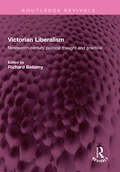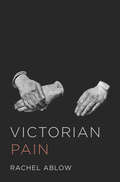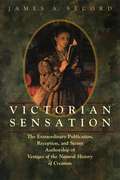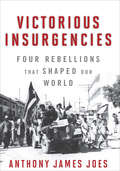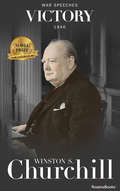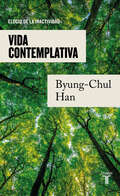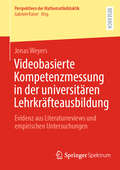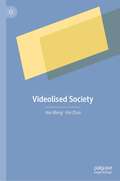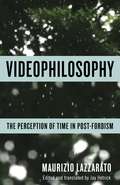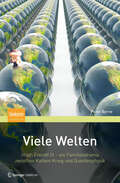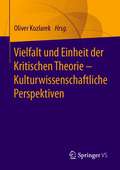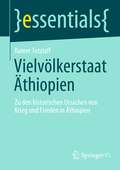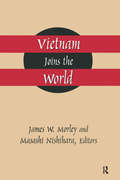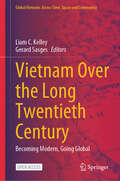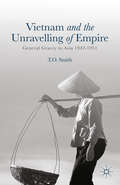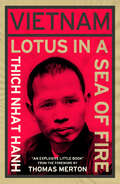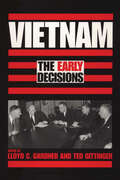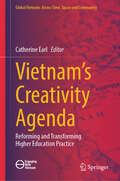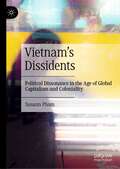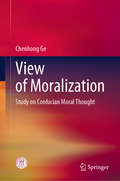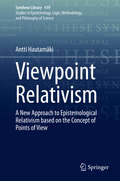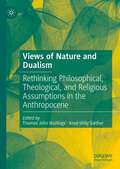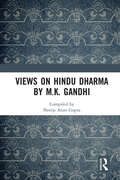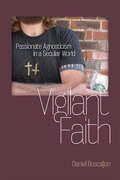- Table View
- List View
Victorian Liberalism: Nineteenth-century political thought and practice (Routledge Revivals)
by Richard BellamyFirst published in 1990, Victorian Liberalism brings together leading political theorists and historians in order to examine the interplay of theory and ideology in nineteenth-century liberal thought and practice. Drawing on a wide range of source material, the authors examine liberal thinkers and politicians from Adam Smith, Jeremy Bentham, and John Stuart Mill to William Gladstone and Joseph Chamberlain. Connections are drawn throughout between the different languages which made-up liberal discourse and the relations between these vocabularies and the political movements and changing social reality they sought to explain. The result is a stimulating volume that breaks new ground in the study of political history and the history of political thought.
Victorian Pain
by Rachel AblowThe nineteenth century introduced developments in science and medicine that made the eradication of pain conceivable for the first time. This new understanding of pain brought with it a complex set of moral and philosophical dilemmas. If pain serves no obvious purpose, how do we reconcile its existence with a well-ordered universe? Examining how writers of the day engaged with such questions, Victorian Pain offers a compelling new literary and philosophical history of modern pain.Rachel Ablow provides close readings of novelists Charlotte Brontë and Thomas Hardy and political and natural philosophers John Stuart Mill, Harriet Martineau, and Charles Darwin, as well as a variety of medical, scientific, and popular writers of the Victorian age. She explores how discussions of pain served as investigations into the status of persons and the nature and parameters of social life. No longer conceivable as divine trial or punishment, pain in the nineteenth century came to seem instead like a historical accident suggesting little or nothing about the individual who suffers.A landmark study of Victorian literature and the history of pain, Victorian Pain shows how these writers came to see pain as a social as well as a personal problem. Rather than simply self-evident to the sufferer and unknowable to anyone else, pain was also understood to be produced between persons—and even, perhaps, by the fictions they read.
Victorian Sensation: The Extraordinary Publication, Reception, and Secret Authorship of Vestiges of the Natural History of Creation
by James A. SecordFiction or philosophy, profound knowledge or shocking heresy? When Vestiges of the Natural History of Creation was published anonymously in 1844, it sparked one of the greatest sensations of the Victorian era. More than a hundred thousand readers were spellbound by its startling vision--an account of the world that extended from the formation of the solar system to the spiritual destiny of humanity. As gripping as a popular novel, Vestiges combined all the current scientific theories in fields ranging from astronomy and geology to psychology and economics. The book was banned, it was damned, it was hailed as the gospel for a new age. This is where our own public controversies about evolution began. In a pioneering cultural history, James A. Secord uses the story of Vestiges to create a panoramic portrait of life in the early industrial era from the perspective of its readers. We join apprentices in a factory town as they debate the consequences of an evolutionary ancestry. We listen as Prince Albert reads aloud to Queen Victoria from a book that preachers denounced as blasphemy vomited from the mouth of Satan. And we watch as Charles Darwin turns its pages in the flea-ridden British Museum library, fearful for the fate of his own unpublished theory of evolution. Using secret letters, Secord reveals how Vestiges was written and how the anonymity of its author was maintained for forty years. He also takes us behind the scenes to a bustling world of publishers, printers, and booksellers to show how the furor over the book reflected the emerging industrial economy of print. Beautifully written and based on painstaking research, Victorian Sensation offers a new approach to literary history, the history of reading, and the history of science. Profusely illustrated and full of fascinating stories, it is the most comprehensive account of the making and reception of a book (other than the Bible) ever attempted. Winner of the 2002 Pfizer Award from the History of Science Society
Victorious Insurgencies: Four Rebellions that Shaped our World
by Anthony James JoesThe author of Resisting Rebellion examines four of the twentieth century&’s most consequential rebellions—in China, Cuba, Afghanistan, and French Indochina. While insurgencies continue to erupt across the globe, most of them fail to meet their intended aims. But in Four Rebellions that Shaped Our World, Anthony James Joes analyzes four successful rebellions which permanently altered the global political arena: the Maoists in China against Chiang Kai-shek and the Japanese in the 1930s and 1940s; the Viet Minh in French Indochina from 1945 to 1954; Castro's followers against Batista in Cuba from 1956 to 1959; and the mujahideen in Soviet Afghanistan from 1980 to 1989. Joes illuminates patterns of failed counterinsurgencies, highlighting their avoidable political and military blunders as well as the critical influence of the international setting. Offering provocative insights that are applicable to twenty-first century geopolitics, this comprehensive study will be of great interest to policy-makers and concerned citizens alike.
Victory: 1946 (Winston S. Churchill War Speeches #4)
by Winston S. ChurchillThe Nobel Prize-winning Prime Minister&’s historic speeches from the final year of WWII are collected in this essential volume. During the final eight months of World War II, Prime Minister Winston Churchill gave some of the most brilliant and consequential speeches of his career. Here are Churchill&’s war status reports delivered to the House of Commons, his rousing statements to the British people, and his global broadcasts, including his announcement of Germany&’s unconditional surrender on May 8th, 1945. These speeches detail Churchill's public reactions to the forming of the United Nations, the death of Roosevelt, the dropping of the Atomic Bomb, and, lastly, the election that defeats him. Perhaps most notable is the "Gestapo" speech of 1945, in which Churchill made a controversial comparison between a Socialist government and the Gestapo—an extremely charged word at that time—that many believe cost him his job as Prime Minister.
Vida contemplativa: Elogio de la inactividad
by Byung-Chul HanUn poderoso llamamiento a abandonar la vida hiperactiva para recuperar el sentido de nuestras vidas, el equilibrio y la riqueza interior. Estamos perdiendo nuestra capacidad de no hacer nada. Nuestra existencia está completamente absorbida por la actividad y, por lo tanto, completamente explotada. Dado que solo percibimos la vida en términos de rendimiento, tendemos a entender la inactividad como un déficit, una negación o una mera ausencia de actividad cuando se trata, muy al contrario, de una interesante capacidad independiente. Byung-Chul Han indaga en los beneficios, el esplendor y la magia de la ociosidad y diseña una nueva forma de vida, que incluya momentos contemplativos, con la que afrontar la crisis actual de nuestra sociedad y frenar nuestra propia explotación y la destrucción de la naturaleza.
Videobasierte Kompetenzmessung in der universitären Lehrkräfteausbildung: Evidenz aus Literaturreviews und empirischen Untersuchungen (Perspektiven der Mathematikdidaktik)
by Jonas WeyersInnerhalb der Forschung zur professionellen Kompetenz von Lehrkräften kommen vermehrt videobasierte Kompetenzmessungen zum Einsatz. Durch die Kombination von Videomaterial unterrichtlicher Praxis mit spezifischen Testfragen sollen Rückschlüsse auf handlungsnahe Kompetenzen bzw. sogenannte situationsspezifische Fähigkeiten von Lehrkräften ermöglicht werden. Auf Basis von zwei Literaturreviews untersucht die vorliegende Arbeit die Konzeption und Erfassung situationsspezifischer Fähigkeiten am Beispiel des Konstrukts "Teacher Noticing", welches in der mathematikdidaktischen Forschung besonders verbreitet ist, und gibt einen umfassenden Überblick zu vorliegenden Testinstrumenten, die auf dieses Konstrukt abzielen. Insbesondere wird diskutiert, inwieweit unterschiedliche Messansätze zu vergleichbaren Ergebnissen führen und welche Konsequenzen sich aus der Heterogenität der Messansätze für den wissenschaftlichen Diskurs ergeben. Anhand zweier empirischer Arbeiten wird weiterführend geprüft, inwieweit anspruchsvolle videobasierte Kompetenzmessungen bereits mit Lehramtsstudierenden einsetzbar sind und Rückschlüsse auf deren Kompetenzentwicklung zulassen. Die Ergebnisse stützen dabei grundsätzlich die Einsetzbarkeit in der universitären Phase der Lehrkräfteausbildung, wobei sich nur geringe Zusammenhänge zu den Lerngelegenheiten innerhalb dieses Ausbildungsabschnitts zeigen.
Videolised Society
by Hui Zhao Jian MengThis book traces the development of video (especially short video, duan shipin) in China over the past few years, exploring how these videos engaged with China’s rapidly changing society, how they enriched existed theories of society, media and communication, and new theories to be extracted. The book offers a new, critical model for understanding the relationship between video, video theory, video industry and the State. This book sheds light on the overall description and explanation of the current socio-political, economic and cultural environment concerning the development of video (especially short video). It interprets the emergence of the “Social Videolization” through the subjects of media psychology, communication studies and cultural criticism, media industrial studies, sociology and anthropology.
Videophilosophy: The Perception of Time in Post-Fordism (Columbia Themes in Philosophy, Social Criticism, and the Arts)
by Maurizio LazzaratoThe Italian philosopher Maurizio Lazzarato has earned international acclaim for his analysis of contemporary capitalism, in particular his influential concept of immaterial labor and his perceptive writings on debt. In Videophilosophy, he reveals the underpinnings of contemporary subjectivity in the aesthetics and politics of mass media. First written in French and published in Italian and later revised but never published in full, this book discloses the conceptual groundwork of Lazzarato’s thought as a whole for a time when his writings have become increasingly influential.Drawing on Bergson, Nietzsche, Benjamin, Deleuze and Guattari, and the film theory and practice of Dziga Vertov, Lazzarato constructs a new philosophy of media that ties political economy to the politics of aesthetics. Through his concept of “machines that crystallize time,” he argues that the proliferation of digital technologies over the past half-century marks the transition to a new mode of capitalist production characterized by unprecedented forms of subjection. This new era of the commodification of the self, Lazzarato declares, demands novel types of political action that challenge the commercialization and exploitation of time. This crucial text by an essential contemporary thinker offers vital new perspectives on aesthetics, politics, and media and critical theory.
Viele Welten
by Peter ByrnePeter Byrne erzählt die Lebensgeschichte von Hugh Everett III (1930-1982), dessen Theorie der multiplen Universen die Physik und Philosophie entscheidend beeinflusst hat. Neben seiner berühmten Interpretation der Quantenmechanik verfasste Everett eine klassische Arbeit zur Spieltheorie, entwickelte wegweisende Computeralgorithmen und leistete Pionierarbeit auf dem Gebiet der Künstlichen Intelligenz. Diesem anschaulichen Porträt liegen bisher unveröffentlichte Schriften Everetts zugrunde sowie Interviews mit Freunden, Kollegen und Verwandten.
Vielfalt und Einheit der Kritischen Theorie – Kulturwissenschaftliche Perspektiven
by Oliver KozlarekDie in diesem Buch versammelten Arbeiten gehen der Frage nach, ob die Tradition der Kritischen Theorie mit ihrer multifokalen und vor allem interdisziplinären kritischen Sozialforschung dem Anspruch einer übergreifenden politischen wie wissenschaftlichen Praxis der Kritik für unsere aktuellen Gesellschaften gerecht wird. Es geht somit auch um eine „Aktualisierung“ der Kritischen Theorie. Diese soll aber gerade nicht durch das Herausarbeiten eines neuen Begriffsinstrumentariums diagnostischer und/oder normativer Art geschehen, sondern dadurch, dass ganz im Sinne des interdisziplinären Forschungsansatzes der Kritischen Theorie unsere hochkomplexen spätmodernen Gesellschaften als Räume transparent werden, in denen sich unterschiedliche Erfahrungslinien kreuzen.
Vielvölkerstaat Äthiopien: Zu den historischen Ursachen von Krieg und Frieden in Äthiopien (essentials)
by Rainer TetzlaffDas Essential analysiert die historischen Ursachen von Krieg und Frieden in Äthiopien im Kontext von Reichsgründung und Modernisierung seit der Mitte des 19. Jahrhunderts. Es stellt die aktuellen Rivalitäten zwischen den Völkern der Tigray, Eritreer, Amharen und Oromo seit der Abschaffung der Monarchie 1974 in den Vordergrund und diskutiert die politischen Aussichten auf Frieden und interethnische Versöhnung unter der Herrschaft des amtierenden Premierministers Abiy Ahmed – Friedensnobelpreisträger und Kriegsherr zugleich.
Vietnam Joins the World: American and Japanese Perspectives
by James Morley Masashi NishiharaTen American and Japanese specialists offer a comprehensive analysis of one of the most dramatic developments in Asia today: the re-emergence of Vietnam - not as the belligerent champion of a militant ideology and socialist cause, but as an open, friendly country seeking a respected place in the world community. Basing their observations on five years of study, visits to Vietnam, and numerous interviews with knowledgeable officials, scholars and businessmen there and in the United States and Japan, the authors evaluate the political, ecnomic, social and foreign policy changes that have been taking place in Vietnam over the past decade, trace the responses of the United States and Japan and offer a policy prescription for responding to the challenges of the future.
Vietnam Over the Long Twentieth Century: Becoming Modern, Going Global (Global Vietnam: Across Time, Space and Community)
by Liam C. Kelley Gerard SasgesThis open access book provides fascinating insights into the incredible changes that Vietnam underwent in the long twentieth century as it transformed from an early modern kingdom to a European colony, to a divided land with opposing ideologies, and to a unified country in a globalized world. At each stage in this long century of changes, there were Vietnamese who sought to mold their society into some vision of “modernity.” The book looks at multiple, rather than one form of modernity, and links those forms with the different political moments that Vietnam experienced, in tandem with the outside interlocutors that were maintained during those periods. As such, this book provides a holistic view of the many forms of modernity and their global links that can be found in Vietnam over the course of the long twentieth century. These multiple modernities are documented in this book, and the authors do so by bringing together the strengths of “traditional” language-based area studies scholarship with the insights that an awareness of trans-national and global perspectives provides. Relevant to historians and researchers in the broader arena of Southeast Asian studies with a particular interest in Vietnam—its journey from past to present—this book is a must-read engagement with a country that has undergone and continues to experience, rapid transformation.
Vietnam and the Unravelling of Empire: General Gracey in Asia 1942-1951
by T. SmithThe Vietnam War and Indian independence devastated British policy towards Asia. The Labour Government failed to understand its commitments. Yet some senior British officers were prepared to work alongside Asian nationalism in order to secure British interests. This created a radical local fusion of imperial, diplomatic and humanitarian policies.
Vietnam: A Buddhist Proposal for Peace
by Thich Nhat HanhThis stunning commentary on the cultural and political background to the war in Vietnam resonates deeply as the first work of Vietnamese writer, peace activist, and Buddhist monk Thich Nhat HanhThis rare book from 1967 is one of the very few written in English giving a Vietnamese perspective on the Indochina Wars. Many years ahead of its time, Vietnam: Lotus in a Sea of Fire will be welcomed by historians and readers of contemporary Vietnamese narratives. As war raged in Vietnam, the Zen monk Thich Nhat Hanh became a leading figure in the Buddhist peace movement. With the help of friends like Catholic monk Thomas Merton, he published Vietnam: Lotus in a Sea of Fire in 1967 in the US (and underground in Vietnam as Hoa Sen Trong Biển Lửa), his uncompromising and radical call for peace. It gave voice to the majority of Vietnamese people who did not take sides and who wanted the bombing to stop. Thomas Merton wrote the foreword, believing it had the power to show Americans that the more America continued to bomb Vietnam, the more communists it would create. This was Thich Nhat Hanh's first book in English and made waves in the growing anti-war movement in the United States at the time. Thich Nhat Hanh's portrayal of the plight of the Vietnamese people during the Indochina Wars is required reading now as the United States and Europe continue to grapple with their roles as global powers—and the human effects of their military policies. Vietnam: Lotus in a Sea of Fire is of special interest for students of peace and conflict studies and Southeast Asian history. It also gives the reader insights into the thought of the young Thich Nhat Hanh, who would later go on to found--in exile--Plum Village in France, the largest Buddhist monastery outside Asia, and influence millions with his teachings on the path of peace and mindfulness.
Vietnam: The Early Decisions
by Lloyd C. Gardner and Ted GittingerThis anthology examines the turmoil and conflicting advice that led the US into Vietnam and the roles played by Presidents Kennedy and Johnson. For many Americans, Oliver Stone&’s film JFK left no doubt that before his assassination Kennedy had determined to quit Vietnam. Yet the historical record offers a more complex view. In this fresh look at the archival evidence, noted scholars take up the challenge to provide us with their conclusions about the early decisions that put the United States on the path to the greatest American tragedy since the Civil War. The book is divided into four sections. Parts one and two delve into the political and military contexts of the early decisions. Part three raises the intriguing questions of Kennedy&’s and Johnson's roles in the conflict, particularly the thorny issue of whether Kennedy did, in fact, intend to withdraw from Vietnam and whether Johnson reversed that policy. Part four reveals an uncanny parallel between early Soviet policy toward Hanoi and US policy toward Saigon.
Vietnam’s Creativity Agenda: Reforming and Transforming Higher Education Practice (Global Vietnam: Across Time, Space and Community)
by Catherine EarlThis book gathers a diverse set of empirical research chapters from practitioners in the higher education sector in Vietnam to explore the effects of higher education reform on university learning and teaching from the point of view of the classroom educators. Through action research, reflective practice, and other qualitative methods, the book investigates the transformations of learning and teaching practice from top-down to bottom-up, teacher-centred to student-centred, curriculum-oriented to skills-based, institutionally directed to partner integrated, and co-designed approaches. In doing so, the book challenges a rethinking of Vietnamese higher education. It reveals the ingredients for transformative education and calls for educators to be empowered with support, resources, and trust. Drawing on a broad range of disciplinary backgrounds about Vietnam’s university reforms, it is highly relevant to social anthropologists, educational specialists, and policymakers working in higher education reform, not only in Vietnam and other Southeast Asian contexts, but globally.
Vietnam’s Dissidents: Political Dissonance in the Age of Global Capitalism and Coloniality
by Susann PhamThis book is the first ethnography on Vietnam’s contemporary dissident movement. As a country that became known and is still remembered as one of the last remnants of Communist revolutions, Vietnam has managed to lift itself from one of the poorest war-torn post-colonies to one of the fastest growing market economies in Southeast Asia. Yet, while holding on to the legacy of a communist-led liberation movement, the present-day Communist Party of Vietnam (CPV) finds itself subject to political challenges from below. In recent years, dissident voices critical of the party-state's malgovernance over social, economic and environmental issues have mushroomed across classes, generations and provinces. Based on extensive ethnographic data, this book explores distinct political practices and political ideas of Vietnam's dissidents. It examines different anti-capitalist and anti-authoritarian practices of democracy, labour, peasant and religious activists and reveals that anti-capitalist and anti-authoritarian practices are—at times—motivated by nationalist, anti-communist and statist ideas and ideologies. Understanding this dissonance between political practices and political ideas within the context of global capitalism and coloniality lies at the heart of this book.
View of Moralization: Study on Confucian Moral Thought
by Chenhong GeThis book summarizes the author’s extensive research on Confucian morality issues and focuses on elaborating the extremely important and unique role of moral thought in Confucian ideology. The book shares the author’s own standpoints on a range of issues – including where moral thoughts originated, what the major principles are, and what methods were adopted in Confucianism – to form a comprehensive and in-depth interpretation, and help readers achieve a better understanding.Moreover, the book focuses on the similarities and differences between Chinese and western cultures and presents an in-depth analysis of the differences and roots regarding various aspects, including Chinese and western historical development paths, thoughts and cultures, national spirits, national mentalities, and social governance models. The formation of either culture has its own practical reasons and historical roots. The book represents a major contribution, helping readers understand the similarities and differences between Chinese and western cultures and social civilizations, enabling them to integrate and learn from Chinese and western cultures, and promoting a better development for Chinese society and the international community alike. Combining detailed data and an approachable style, it contributes to the legacy of Confucianism by applying a critical attitude. The author thinks out of the box in terms of theoretical analysis and studies on certain issues. As such, the book will be of great academic value in terms of studying China’s ideological culture, especially its morality culture, and will benefit scholars and research institutions alike.
Viewpoint Relativism: A New Approach to Epistemological Relativism based on the Concept of Points of View (Synthese Library #419)
by Antti HautamäkiThis book offers new insights into truth, knowledge, and reality. It details a unique approach to epistemological relativism based on the concept of points of view. In a point of view, an aspect represents an object for a subject. By applying this concept of points of view, the author develops a consistent and adequate form of relativism, called viewpoint relativism, according to which epistemic questions like “Is X true (or justified or existing)” are viewpoint-dependent. The monograph examines central issues related to epistemological relativism. It analyzes major arguments pro and con from different opinions. The author presents the arguments of well-known philosophers. These include such thinkers as Paul Boghossian, John Dewey, Nelson Goodman, Martin Kusch, C.I. Lewis, John MacFarlane, Hilary Putnam, W.V.O. Quine, Richard Rorty, John Searle, and Ludwig Wittgenstein. In the process, the author deconstructs the standard account of correspondence theory of truth. Viewpoint relativism is a moderate relativism, which is not subjected to standard criticism of extreme relativism. This book argues that knowledge creation presupposes openness to different points of view and their comparison. It also explores the broader implications of viewpoint relativism into current debate about truth in society. The author defends a critical relativism, which accepts pluralism but is critical against all points of view. In the conclusion, he explores the relevance of viewpoint relativism to democracy by showing that the main threat of modern democratic society is not pluralism but absolutism and fundamentalism.
Views of Nature and Dualism: Rethinking Philosophical, Theological, and Religious Assumptions in the Anthropocene
by Knut-Willy Sæther Thomas John HastingsIn the face of the anthropogenic threats to the singular planetary habitat we share with other human beings and non-human species, humanities scholars feel a renewed sense of urgency 1) to acknowledge the ways our species has funded particular histories of environmental exploitation, alienation, and collapse, 2) to unpack inherited assumptions that impact our views of nature and interspecies relations, and 3) to suggest ways of thinking and acting that seek to repair the damage and promote mutual flourishing for all of earth inhabitants. This volume brings together scholars in philosophy, theology, and religion who take up this urgent ethical task from a broad range of perspectives and locations.
Views on Hindu Dharma by M.K. Gandhi
by Neerja Arun GuptaMohandas Karamchand Gandhi took pride in calling himself a Sanatani Hindu. He lived by what he professed. Indeed, he spiritualized his entire political existence and his very opinion, world view and discourse was weighted with morality and ethics born of Hindu Dharma.This timely compilation of Mahatma Gandhi’s views on Hindu Dharma is a remarkable and systematically arranged compendium of his ideas on every aspect of India’s social and political life.Gandhi’s views – disseminated through many short essays in Harijan and other journals of his time – on Sanatan Dharma, idol worship, Rama as a God, compulsory teaching of Gita in schools, conversion, cow-slaughter and protection, varnashramas, untouchability and other aspects are presented here in his own words.This volume is indispensable for scholars of Modern South Asian History, Gandhian Thought, Colonialism and Religious Studies. Please note: Taylor & Francis does not sell or distribute the Hardback in India, Pakistan, Nepal, Bhutan, Bangladesh and Sri Lanka
Vigilant Faith: Passionate Agnosticism in a Secular World (Studies in Religion and Culture)
by Daniel BoscaljonIn Vigilant Faith: Passionate Agnosticism in a Secular World, Daniel Boscaljon takes up the contemporary challenges to faith by skepticism and secularism. He proposes a model of faith for believers and unbelievers alike—a passionate agnosticism—that is rooted in a skeptical consciousness. Skepticism and faith are structurally similar, he writes, in that they share an "unknowing" quality. The author argues that vigilance—the act of keeping watch, a spiritual practice in its own right—is as necessary a precondition for the structure of faith as it is for the structure of skepticism. A suspension in uncertainty and an openness to possibility require vigilance, he attests, if faith and skepticism are to avoid the often dogmatic tendencies of both theism and atheism to cling to their own brands of certainty and knowledge.Boscaljon has three aims: to expand the current, post-theistic definitions of God for greater relevance to human beings on an individual and existential level; to integrate skepticism into faith so that it will restore the importance of faith to current theology and recover it from anti-intellectual bias; and to conceptualize the vigilance of faith in such a way that can provide a vocabulary for distinguishing "good faith" from "bad faith." He offers a variety of cultural examples ranging from film to poetry to represent a life of faith and to show how its components come together in practice. As an alternative to the prevailing fundamentalisms in today's world, his book proposes a paradigmatic understanding of faith in which theism, atheism, and agnosticism refuse to differ.
Vilém Flusser: An Introduction (Electronic Mediations)
by Rainer Guldin Anke Finger Gustavo BernardoVilém Flusser (1920–1991) has long been known and celebrated in Europe and Brazil primarily as a media theorist. Only recently have other facets of his accomplishments come to light, clearly establishing Flusser as a key thinker. An accessible and thorough introduction to Flusser&’s thought, this book reveals his engagement with a wide array of disciplines, from communication studies, posthuman philosophy, media studies, and history to art and art history, migrant studies, anthropology, and film studies. The first to connect Flusser&’s entire oeuvre, this volume shows how his works on media theory are just one part of a greater mosaic of writings that bring to the fore cultural and cognitive changes concerning all of us in the twenty-first century.A theorist deeply influenced by his experiences as a privileged citizen of Prague, a Jew pursued by the Nazis, a European emigrant, a Brazilian immigrant, and a survivor keenly interested and invested in history and memory, Vilém Flusser was an outsider in a staunchly hierarchical and disciplined academic world.
